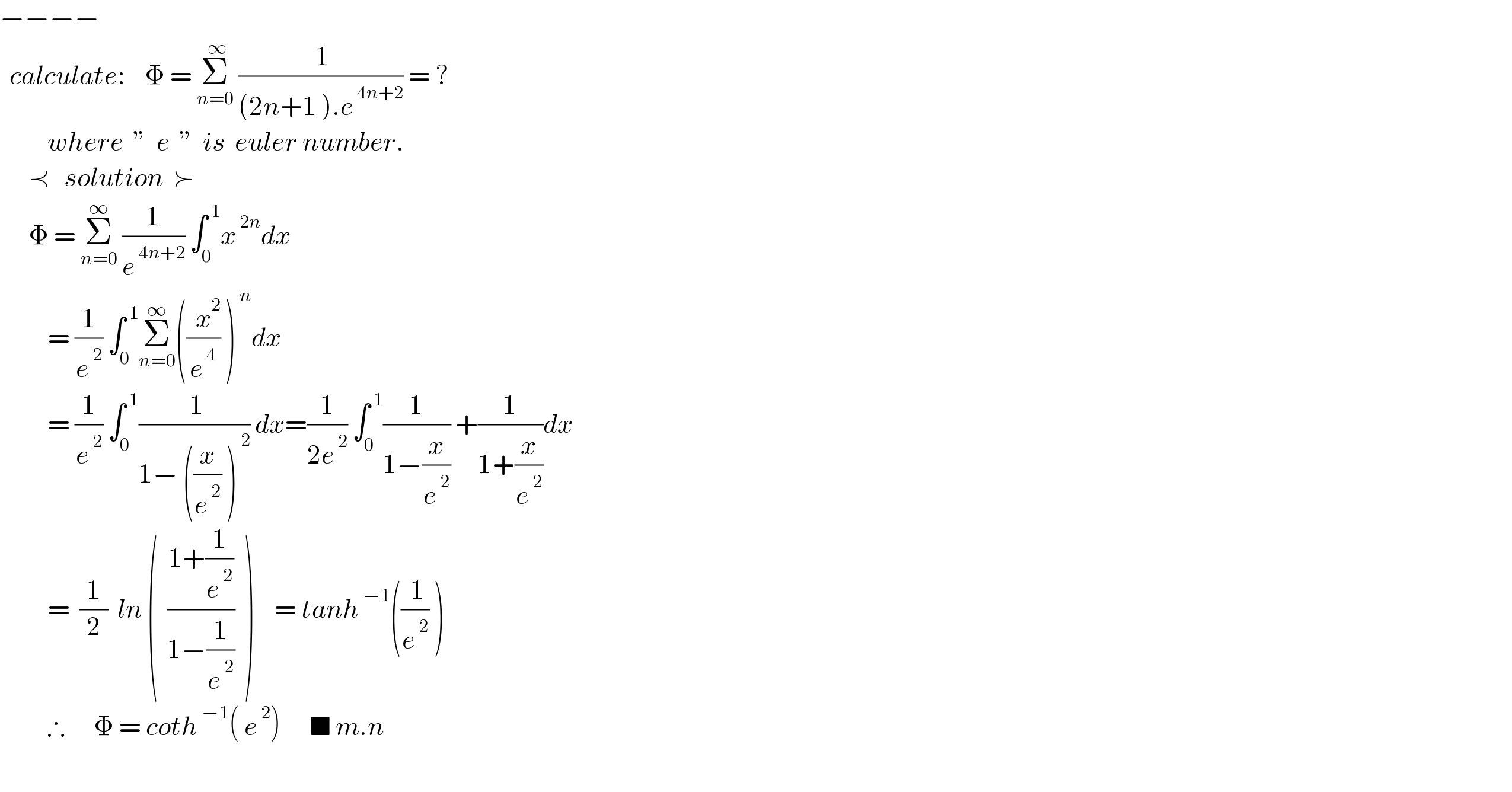Question Number 176566 by mnjuly1970 last updated on 21/Sep/22

$$−−−− \\ $$$$\:\:{calculate}:\:\:\:\:\Phi\:=\:\underset{{n}=\mathrm{0}} {\overset{\:\infty} {\sum}}\:\frac{\:\mathrm{1}}{\left(\mathrm{2}{n}+\mathrm{1}\:\right).{e}^{\:\mathrm{4}{n}+\mathrm{2}} }\:=\:? \\ $$$$\:\:\:\:\:\:\:\:\:\:{where}\:\:''\:\:{e}\:\:''\:\:{is}\:\:{euler}\:{number}. \\ $$$$\:\:\:\:\:\:\prec\:\:\:{solution}\:\:\succ \\ $$$$\:\:\:\:\:\:\Phi\:=\:\underset{{n}=\mathrm{0}} {\overset{\infty} {\sum}}\:\frac{\mathrm{1}}{{e}^{\:\mathrm{4}{n}+\mathrm{2}} }\:\int_{\mathrm{0}} ^{\:\mathrm{1}} {x}^{\:\mathrm{2}{n}} {dx} \\ $$$$\:\:\:\:\:\:\:\:\:\:=\:\frac{\mathrm{1}}{{e}^{\:\mathrm{2}} }\:\int_{\mathrm{0}} ^{\:\mathrm{1}} \underset{{n}=\mathrm{0}} {\overset{\infty} {\sum}}\left(\frac{\:\:{x}^{\mathrm{2}} }{{e}^{\:\mathrm{4}} }\:\right)^{\:{n}} {dx}\: \\ $$$$\:\:\:\:\:\:\:\:\:\:=\:\frac{\mathrm{1}}{{e}^{\:\mathrm{2}} }\:\int_{\mathrm{0}} ^{\:\mathrm{1}} \frac{\:\mathrm{1}}{\mathrm{1}−\:\left(\frac{{x}}{{e}^{\:\mathrm{2}} }\:\right)^{\:\mathrm{2}} }\:{dx}=\frac{\mathrm{1}}{\mathrm{2}{e}^{\:\mathrm{2}} }\:\int_{\mathrm{0}} ^{\:\mathrm{1}} \frac{\mathrm{1}}{\mathrm{1}−\frac{{x}}{{e}^{\:\mathrm{2}} }}\:+\frac{\mathrm{1}}{\mathrm{1}+\frac{{x}}{{e}^{\:\mathrm{2}} }}{dx} \\ $$$$\:\:\:\:\:\:\:\:\:\:=\:\:\frac{\mathrm{1}}{\mathrm{2}}\:\:{ln}\:\left(\:\:\frac{\mathrm{1}+\frac{\mathrm{1}}{{e}^{\:\mathrm{2}} }}{\mathrm{1}−\frac{\mathrm{1}}{{e}^{\:\mathrm{2}} }}\:\:\right)\:\:\:\:=\:{tanh}^{\:−\mathrm{1}} \left(\frac{\:\mathrm{1}}{{e}^{\:\mathrm{2}} }\:\right) \\ $$$$\:\:\:\:\:\:\:\:\:\:\therefore\:\:\:\:\:\:\Phi\:=\:{coth}^{\:−\mathrm{1}} \left(\:{e}^{\:\mathrm{2}} \right)\:\:\:\:\:\:\blacksquare\:{m}.{n}\:\:\:\: \\ $$$$\:\:\:\: \\ $$
